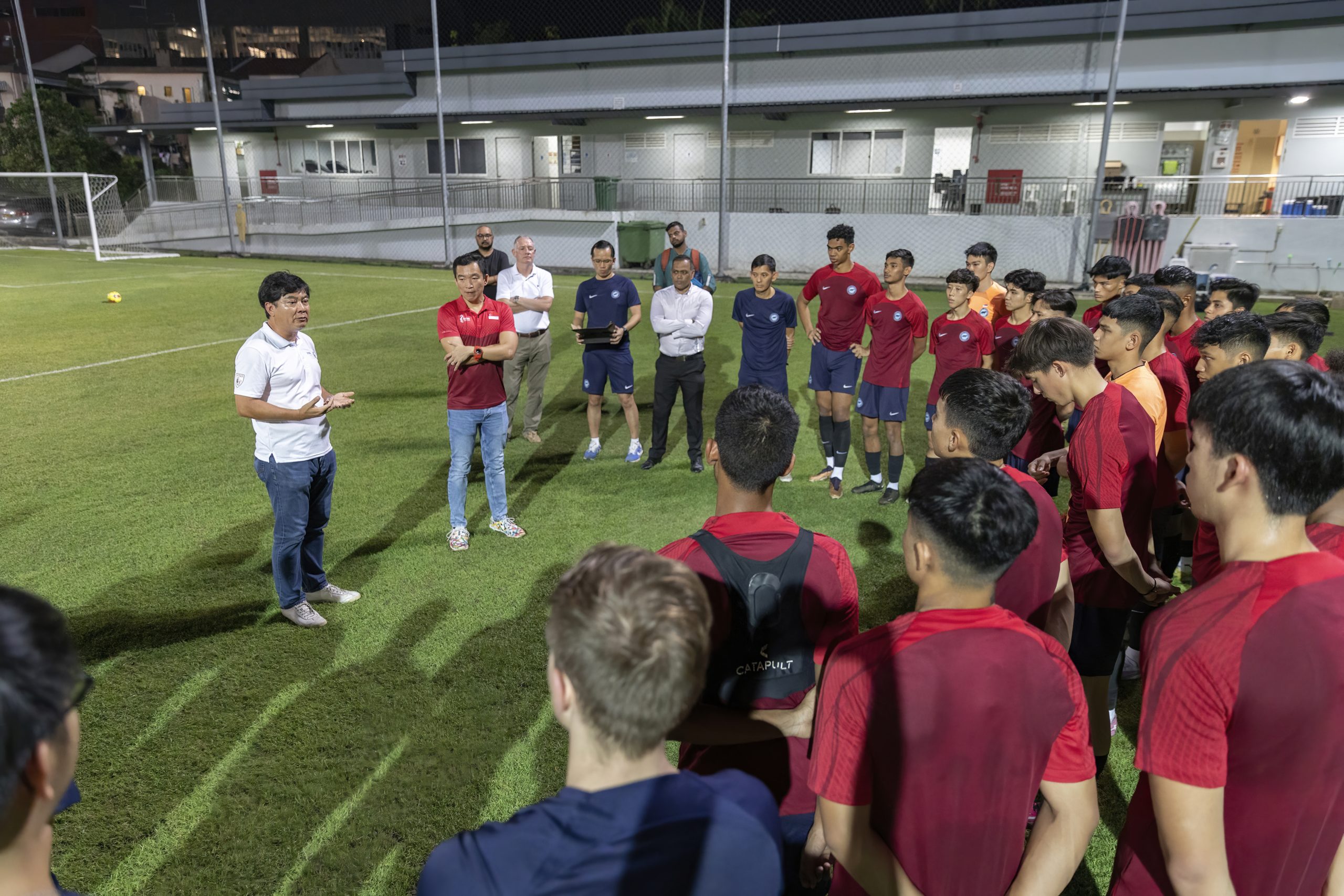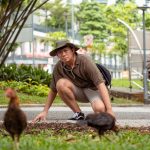Top Image: Football Association of Singapore / Instagram
The famous Singapore roar fell silent after the country’s final group game of the 32nd SEA Games in Cambodia on May 1. The Singapore football team lost 7-0 to its neighbour, Malaysia.
Losing to our prime football rivals proved to be an emotional affair for both die-hard fans and casual observers.
ADVERTISEMENT
Of course, my friends and I, ardent football fans since teenagers, knew that we were in no place to level the same criticisms against the national team—fellow countrymen sacrificing their time and energy to represent Singapore at an international level.
A good handful of Singaporeans felt otherwise, bemoaning yet another disheartening performance.
However, the criticisms levelled against the Singapore SEA Games football team were targeted at more than just recent performances. It seemed like the football team was stuck in a rut under the leadership of the Football Association of Singapore (FAS).
In January, the national football team suffered a 4-1 defeat to Malaysia in the AFF Mitsubishi Electric Cup. In October 2021, Singapore bowed out of the Under-23 Asian Cup qualifiers after a 5-1 loss to South Korea.
It’s not all bad. Singaporeans rallied around the national team when they lost 4-2 to Indonesia in the AFF Suzuki Cup in December 2021. Perhaps, what Singaporean fans expect is a fighting spirit, regardless of scoreline. It was hardly shown when we lost to Malaysia 7-0.
Singaporeans came with burning questions about the national team and its management.
And FAS Acting President, 56-year-old Mr Bernard Tan, is ready to answer those queries.
I catch Bernard in the middle of his work day. On top of FAS commitments, he is the Managing Director of Asia Pulp and Paper at Sinar Mas, a large Indonesian conglomerate. He is a picture of tranquillity, a stark contrast to his emotional state after the devastating loss—he recently apologised for a blunt Instagram remark to a fan’s comments.
The loss stirred yet another reaction from the interim president. This time, he has his sights set on an almost Sisyphean task: To turn Singapore football around.
RICE: I imagine watching Singapore lose to Malaysia by a huge margin must have been horrible for you, personally and professionally. What was going through your mind?
Mr Bernard Tan: I am a fan of Singapore football, but as part of the Football Association of Singapore, I felt double the pain—more than the average fan. To watch them crumble in the way they did was quite devastating to me.
But it’s not just me. Since the event, I’ve also managed to catch up with various people, including some of the players, and I think everybody involved in that mauling did not see it coming. Honestly, some of the players, they’re shell-shocked. They cannot explain what happened. For all of them, they’re still processing exactly what happened.
ADVERTISEMENT
It is one of those very dark days where everything just went wrong. It’s obviously something that I carry in my heart, right? It’s obviously not good enough.
We’ve watched football long enough to know that a team that’s organised should never lose by that score line. Somewhere along the line, we lost that organisation, we lost that discipline, and produced a performance that, we as a nation, just cannot accept.
I think Singaporeans are wise enough to accept that we may not be the best team in ASEAN. But we expect a performance that’s worthy of a jersey that we wear. The players also know that, and they are hurting as well.
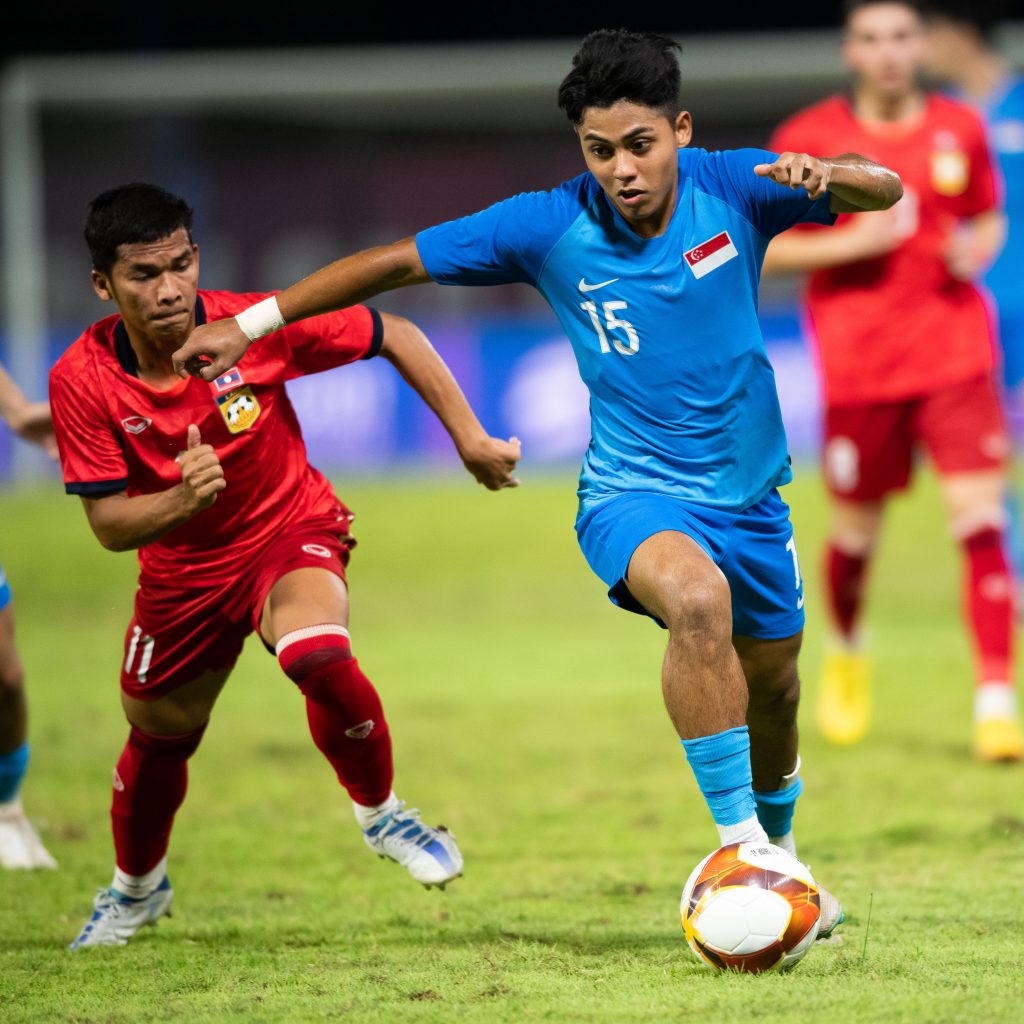
RICE: Netizens took to the internet to level criticisms against the team that represented Singapore at the SEA Games. Do you think the criticisms are valid and justified? Why or why not?
Mr Bernard Tan: I think it’s valid. Our expectation, not just the Singapore fans but the expectation of the entire football fraternity, is when we put on a Singapore jersey, you compete; you show heart; you show grit; you keep yourself organised in a disciplined way to make sure that the opponent dislikes playing you.
Anybody who’s watched soccer before will understand that there are certain approaches to games. And when you’re approaching certain games, where, let’s say, you know, you have injuries, or you have an inferior team, then you set up in a particular way to make yourself incredibly hard to play.
We’ve seen that a lot of times. And so a scoreline of 7-0 does not suggest any of this. I think everyone is entitled to be critical.
RICE: The FAS recently announced a panel to review the SEA Games performance and that the under-22 squad will not be involved in any international tournaments until the review is complete. What was the rationale?
Mr Bernard Tan: People have suggested we are punishing the players. I think, in contrast, we are protecting them. We are saying to them, as well as to all Singaporeans, that we’ll put them back when they are ready.
The review is six weeks long. We promised four weeks for the review to be done and two weeks for the items to be reviewed. Only one tournament will be affected.
That’s going to be held in August. We already had scheduling problems because they advanced the tournament from a November timeframe to August, clashing completely with a lot of the football calendar that we have domestically.
We had discussed whether we wanted to send an under-23 team by forcing it without preparation or sending an under under-19 team to an under-23 tournament. I think given the results we’ve had and the fact that the opponents will be largely the same, both options would not have been a very good choice—both for the players, as well as for the FAS.
So why don’t we take a breather, and give this tournament a skip. In six weeks’ time, no other tournament will be affected.
ADVERTISEMENT
RICE: Some people have raised the possibility of accepting players who are currently playing overseas to represent Singapore. Luke O’Nien, who plays for Sunderland, is eligible to represent England or Singapore under FIFA rules. Is the FAS looking into it?
Mr Bernard Tan: We have our eye on a whole set of pools of talent.
This includes, obviously, Singaporeans and foreigners of Singaporean lineage who are eligible under FIFA rules to come in.
We can also help ourselves by making younger foreigners come to Singapore as an additional source. So we are trying to see whether we can also have avenues for the SPL to introduce foreigners to come in.
One of the challenges—of which there are many—is the fact that Singapore does not recognise dual citizenship. Several countries in ASEAN do. For them, it’s a much easier process. But for us, we hold our citizenship rights dear.
It does involve them renouncing their previous citizenship, which could lead to certain complications. Given the fact that the people who we’re trying to naturalise have some roots in another country is a concern.
For example, if [Luke O’Nien] gives up his British citizenship, he will have to play for Sunderland as a foreigner. And we’re quite sure there will be obstacles.
Nevertheless, we will explore these possibilities.
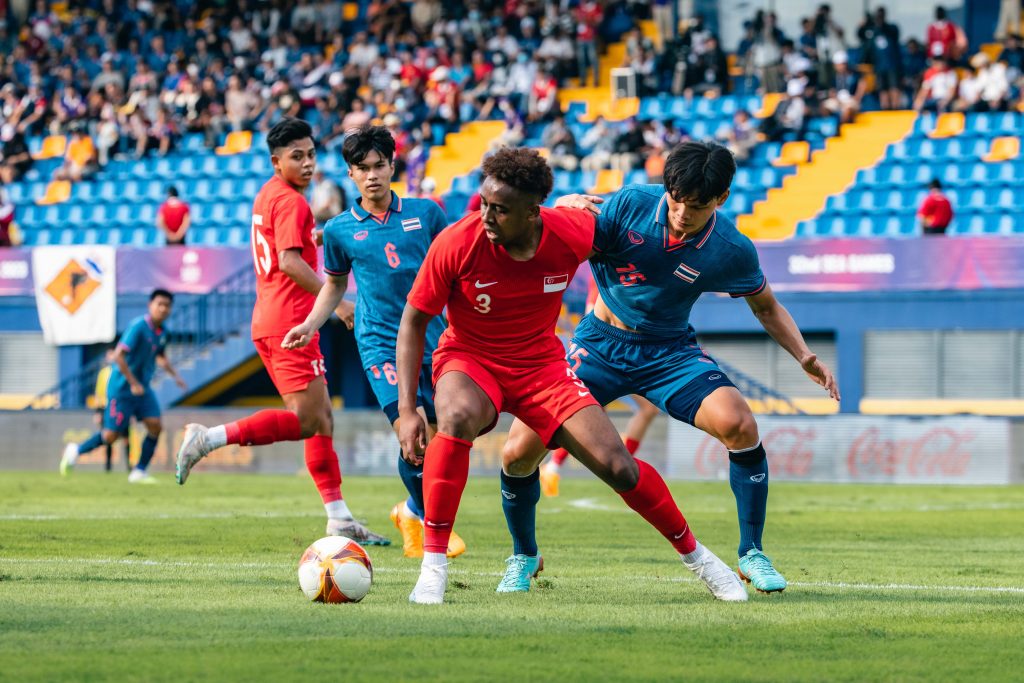
RICE: The FAS also recently started the Unleash The Roar (UTR) Movement. Can you explain what the UTR movement intends to do?
Mr Bernard Tan: Let me explain a bit about the difference in capability and ability in Southeast Asia. If you see the SEA Games squad Thailand team, the players have all had a significant amount of appearances in the Thai first division.
If you look at our team, there was only one player with over 30 appearances. That was Jared Gallagher, the vice-captain. For many of the Singapore players, they did not even have 20 appearances over two seasons—let alone 20 matches in a season. I think the difference in just experience level is quite stark.
I’ll give you one example. The goal scorer in the finals against Indonesia, he’s 17. He has clocked 33 appearances in the Thai second division. This shows that the players are already regulars over one to three seasons. In comparison, our players are struggling to break into many of the first teams.
Our problem has always been that our development system gets players debuting and performing at the highest level quite late. The average age of debuting in the SPL is about 21 to 22 years old.
When we go for age group tournaments, when there are opponents playing at a very young age, there are differences that are going to be very stark.
Unleash The Roar had a core idea: How do we get players to develop on a faster trajectory and debut at a higher level earlier in their life cycles?
It’s the aim of getting a player to make his debut in the SPL at the age of 17, so when he goes to the SEA games, he has three to four seasons under his belt. The whole idea of Unleash The Roar is to accelerate player development so that our best players are playing at a much higher level at an earlier age.
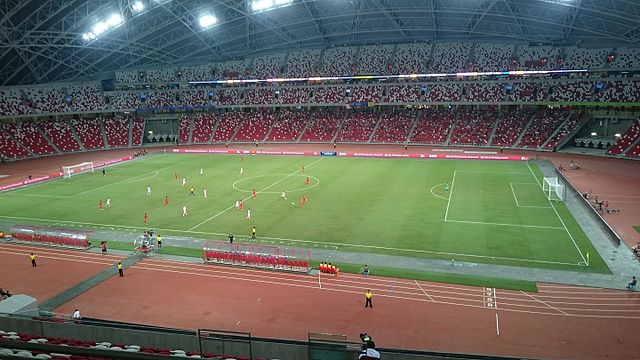
RICE: The on-the-ground sentiment is that public money should be diverted to other sports which have a more promising chance of winning gold. Thoughts?
Mr Bernard Tan: If we go on that basis and fund sports that can get gold medals, then yeah, you know, obviously that will be the priority in funding. But I think there are other objectives you want to have.
What struck me over the last few weeks, if not already very obvious, is that football matters much more to the average Singaporean than any other sport. They’re affected by it. And even casual observers are affected by it.
It’s very hard to explain. But if you look at it carefully, actually, it’s also very simple to explain.
Football is one of the sports that cuts across all races. It cuts across all socioeconomic classes. It cuts across all generations. In all these categories, they love football. You can find people from all walks of life. It also is the only sport that matters to all these groups. It’s a sport that can unite our country together and invoke either pride or despair.
We’ve seen the despair part. We’ve also seen pride in the past. For example, when we won the Malaysia cups, or when we did well in the AFF semifinal, even though we lost to Indonesia. And so I think as an emotional sport, that matters.
Nevertheless, I think we should never take funding for granted.
If we are using the funding and not producing results, I think we should always question it, which is why I’m very optimistic that since we are now focused on Unleash The Roar, funding will lead us to a different level.
RICE: I’m glad you mentioned the Malaysia Cup because recently, Neil Humphreys, on a podcast for Yahoo Southeast Asia said that Singapore football is obsessed with its history of winning the Malaysia Cup. We’re too nostalgic to the point where we forget to look towards future development.
Mr Bernard Tan: He’s got some truth in that. Because I think we have been spoiled as a nation, having achieved so much success in Malaysia Cups, the AFF Championships, and to some degree, the SEA Games in the past.
Any rational football fan who has looked at it a bit more deeply will understand that Singapore has no divine right to be the top player in ASEAN. Our football ecosystem is less developed, has fewer participants, and less money, less resources put into it. Compared to at least five to six other ASEAN nations, if not more.
And so, to expect outcomes beyond what resources suggest is a little bit presumptuous, I suppose.
But therein lies the challenge for Singapore. We’ve always faced this challenge; we’ve always been able to punch beyond our weight.
So it’s not an impossible task to have a football squad from a small country with a less developed ecosystem, if you put your mind to it, to actually beat a much bigger country in football terms. That must be the goal for Singapore going forward.
And this requires not incremental changes but step changes.
Step changes mean that we need to have a project that includes the entire nation behind it, not just words, but action. So obviously we need to have the government come in. We need community, both in stepping up and volunteerism—participating in the football ecosystem. And corporate support.
When we have all three moving together with a singular goal of making sure that we punch beyond well above our football weight. I think it is not impossible. You’ve seen many small countries do it. We want to be one of those countries. And that must be the goal for Singapore.
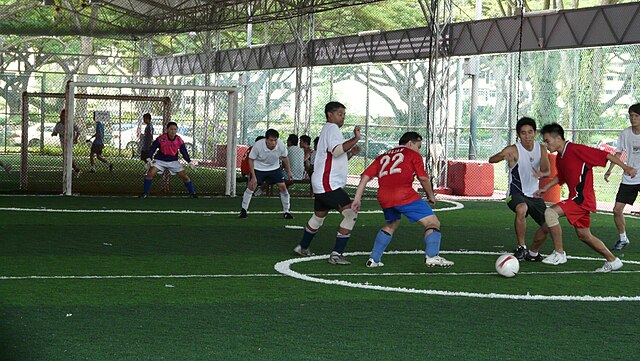
RICE: With all that’s happened in the past couple of weeks, any parting words for Singaporeans?
Mr Bernard Tan: I think it’s a tough time. All I ask from Singaporeans is to give us some space. I know it’s an emotional time. It’s tough.
But I think if you give us space, there will be a reaction. We need time to digest all the things that have happened. The mark of a good organisation is that it’s going to come back stronger.

